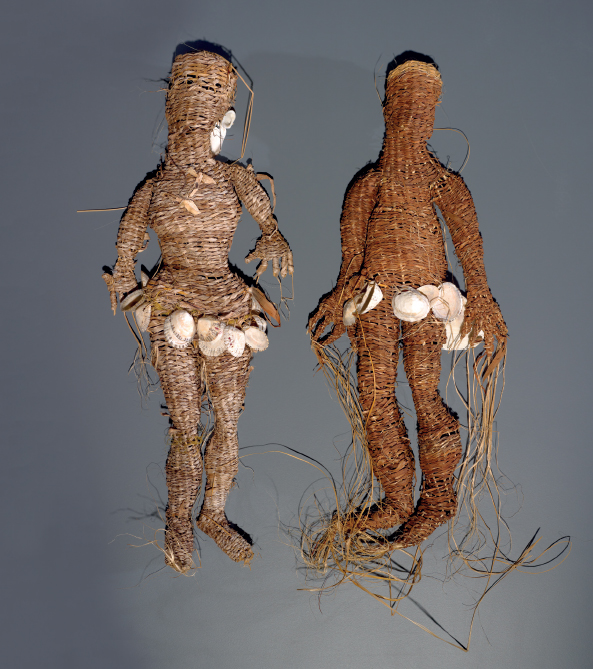
The fine, warm weather of the last three days and the northeaster that had blown gradually stronger a hundred miles off from the Tasman Sea had brought in a huge easterly swell. Then the rain clouds had started across the mountains, moving from the west. Short gusts had buffeted the house in the night as the fronts came through. In the morning, the westerly had evened out. Now it was peeling back the spray on the waves that broke off the bar. Fox paws of wind skittered in front of the wave face. Sand blew off the dunes and streamed across the hard sand. The sea rime bubbled and flecked the shore and blew back into the sea.
There were two distant figures on the beach, walking against the wind. One leaned against the other. Alice watched from the kitchen where she was washing up as John held on to his mother. From this distance they looked like lovers.
Dulcie had stopped eating. She still took tea and occasionally a slice of bread and butter. When they had arrived John had bent to kiss her. He felt her shoulders under the thin cardigan. His hands grasped the bones of her arms. They hadn’t been able to make her eat. Dulcie didn’t want to. She just wanted them there to help her die. John had cried the first time she had said that.
Alice left the washing-up to drain and went out to the verandah. She stood and waited for the two figures to appear at the bottom of the track. A light rain had begun to fall. When she spotted them she put a coat around her shoulders and went down, past the sheds, and took Dulcie’s other arm. When they were inside Dulcie said she would lie down for a bit and, no, she didn’t want a cup of tea.
It was cold. Alice set the kindling and built a pile of driftwood. John made coffee. He brought his father’s pot and two cornflower-blue cups over to the fire. Alice was sitting in Dulcie’s chair. ‘Rex’s cups,’ she said.
They sat and drank the coffee. John’s bluey steamed by the fire. He remembered the times that Rex had promised to take him fishing. He would wake up every hour until dawn and listen for the sound of his father getting up. When the kitchen clock struck seven he would slip out of bed, pad quietly into his father’s room and shake him awake. ‘Dad,’ he’d say, ‘it’s seven o’clock.’
‘We’ll go at eight,’ Rex would say, and turn over. They never went. Rex had always fished at dusk, mostly on his own.
Dulcie was listening to the waves. She could hear the turn of the tide. The waves changed their shape and sound when the tide turned. It would be low tonight. The sandbars would be dangerous. She thought of the way Rex had fished the bar on nights like this, the times he had nearly drowned. ‘Do you want anything?’ Alice asked. Dulcie shook her head and closed her eyes.
‘I might go fishing tonight,’ John said, ‘take the boat out. Dad used to swear the fish jumped into the boat when the weather was like this.’ They sat by the fire until dusk.
Alice drew the cork on one of Rex’s old reds to let it breathe. John was out in the boat. There weren’t many of the old bottles left now. She remembered when Dulcie had found them, after Rex died. Alice had been helping Dulcie to clean out. There were stacks of empty bottles in the tackle shed and three or four boxes of a few good reds.
It was Christmas when Alice had first met Dulcie and Rex. Rex’s eyes had twinkled when she gave him a bottle of wine. ‘Pleased to meet you,’ she had said, bold as brass, ‘Merry Christmas.’ Rex had gone out to the tackle shed, halfway through dinner. He came back with another bottle. ‘To celebrate, Dulcie,’ he had said. ‘It’s Christmas.’
‘Where did you get that?’ Dulcie had asked.
‘I bought it in Dunalley. Just the one. A present, for John and Alice.’
But it turned out that the tackle shed had been full of the stuff. Rex had spent hours in there, fixing nets and casting new sinkers, he used to say.
‘The bloody bastard,’ Dulcie had whispered as she dusted off a bottle and held it up to the cobwebbed window. The wine gleamed like a jewel.
Alice finished the wine and threw some salt-laden pieces of drift on the fire. It popped and cracked. She watched until it died down.
John was still somewhere out on the Boneyards. The bones of dead whales had still been there when Rex was a child. He remembered seeing them on the sea floor through the gloomy sand-specked water of a calm day. The bones had seemed to rise and fall as the boat rode the swell. Boneyards. John had played on the inner sandbars when he was little. He would picture the whales swimming towards him. First one came, then another, then they came in twos and threes, swimming onto the sandbars to help the ones who were stranded, who were already dying. He would picture the bones like the spars and ribs of a hundred ships, bleached a driven white by the waves that broke on the bar. He had imagined the bones sifting into sand as the waves beat against the bar again and again and again.